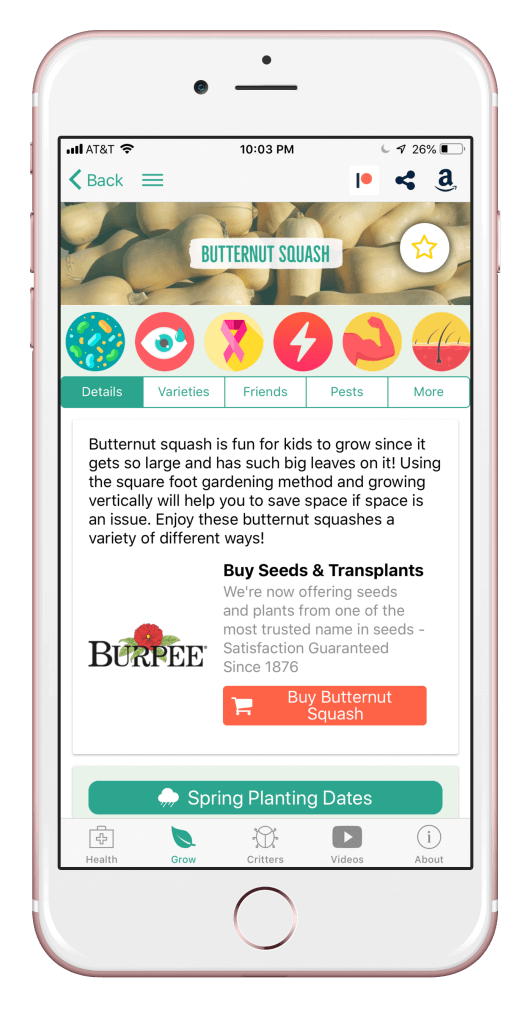Winter Squash Square Foot Gardening
Butternut squash is fun for kids to grow since it gets so large and has such big leaves on it! Using the square foot gardening method and growing vertically will help you to save space if space is an issue. Enjoy these butternut squashes a variety of different ways!
How to Grow:
Sow seeds directly into the soil outdoors as early as 2 weeks after your last spring frost in the spring and throughout the summer up to 14 weeks before your first fall frost. You can see specific dates for your location using our FREE iOS, Android, and Universal Web App.
Sow 1 seed per 2 square feet about 1 inch deep to try and ensure that you have enough space. You can can place a trellis by the squares for the vines to help to save space and grow vertically. Make sure to plant in a space that has full sun, but it can tolerate some shade if needed. Take care to notice what plants are around the area as well, see the companion plant section below. It will take approximately 5-10 days for your seeds to sprout. Provide your acorn squash plant with constant moisture to ensure that it grows adequately.
Companion Plants:
Companion planting is a vital part of organic gardening. Companion plants assist in the growth of others by attracting beneficial insects, repelling pests, or providing nutrients, shade, or support. There are also plants that do not like being next to each other. Some plants get too tall and can provide too much shade for your plant. Sometimes certain plants attract the same pests, so it is important to try and separate these. Herbs are especially great companion plants because they help to repel pests from your other plants!
| Good | Bad | |
| Banana Peppers | Nasturtiums | Potatoes |
| Beans (Pole) | Okra | |
| Bell Peppers | Onions | |
| Catnip | Oregano | |
| Corn | Radish | |
| Hot Peppers | Sunflowers | |
| Leeks | Sweet Peppers | |
| Marigolds | Tarragon | |
| Marjoram | ||
See companion plants for 70+ foods in our FREE iOS, Android, and Universal Web app!
Pests:
Pests can be one of the most difficult challenges you face in the garden. We strive to grow food without the use of pesticide and luckily there are natural solutions for most of these nasty pests! The pests listed below are common ones for butternut squash:
- Cucumber Beetles
- Groundhogs (Woodchucks)
- Spider Mites
- Squash Bugs
- Squash Vine Borer
- Squirrels
- Thrips
Learn more about pests and beneficial insects in our FREE iOS, Android, and Universal Web App!
Harvesting:
You will begin to be able to harvest your butternut squash approximately 100-110 days from first sprout. The best time to harvest is when the temperatures start to dip down close to freezing at night and the leaves and vines begin to die off. Cut the squash from the vine and leave the stem as long as possible.
How to Prepare:
Butternut squash can be prepared in a variety of ways and is super healthy for you! We like it sauteed, baked, and broiled. To prepare the squash, you will cut off the ends and slice in half to peel easiest.
Learn more about growing over 70 different foods, including how to manage various pests in our FREE iOS, Android, or new Universal Web App!

Winter Squash Square Foot Gardening
Source: https://www.seedtospoon.net/how-to-grow-butternut-squash-in-your-backyard/
Posted by: stanbackarniagaten72.blogspot.com

0 Response to "Winter Squash Square Foot Gardening"
Post a Comment